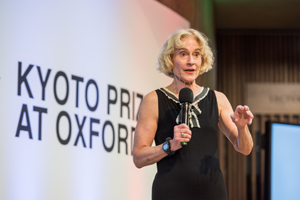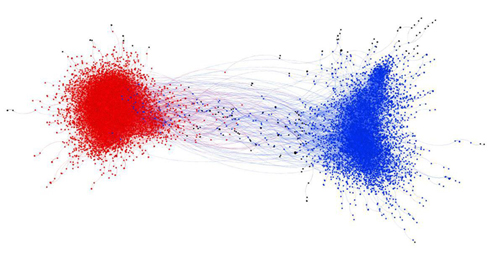
Your complimentary articles
You’ve read two of your four complimentary articles for this month.
You can read four articles free per month. To have complete access to the thousands of philosophy articles on this site, please
News
News: August/September 2017
Martha Nussbaum Calls for Wrinkly Rebellion • Mass extinction • Mass migration • Morality bubbles on Twitter — News reports by Anja Steinbauer
Age Shall Not Weary

Martha Nussbaum
© John Cairns 2017
Martha Nussbaum has for decades been one of America’s best-known living philosophers, energetically bringing her expertise in classical philosophy to bear on an ever-wider range of social and philosophical questions. In May, Professor Nussbaum and her two fellow winners of the 2016 Kyoto Prize travelled to Oxford University’s Blavatnik School of Government to give public lectures about their current work. Nussbaum’s was on ‘Ageing, Stigma and Disgust’. In it she claimed that popular culture, which obsessively glorifies youth, also stigmatises the elderly, encouraging the young to regard their elders with a disgust closely connected with fear. Nussbaum argued that this produces widespread injustice, discrimination and unhappiness. In particular, she said that compulsory retirement has become a huge social evil which we must now fight to overcome.
An Ethics of Migration
Arguments over large-scale migration have rocked politics and society over the last few years but relatively few have come from philosophers with experience of government. Julian Nida-Rümelin is professor of philosophy and political theory at Munich but previously he was a minister in the German federal government led by Gerhard Schröder. In a new book Über Grenzen denken: Eine Ethik der Migration Nida-Rümelin thinks about the nature of borders and boundaries – those that individuals might draw and those that a state may legitimately decree. He calls for and tries to develop an ethics of migration. He argues that global justice and collective autonomy depend on political institutions within the framework of a nation state. While Nida-Rümelin believes it to be a moral duty to open borders to refugees in need of protection, he is sceptical about their integration and social care.
Karl-Otto Apel
German philosopher Karl-Otto Apel died on 15 May 2017 at the age of 95. Apel was an influential thinker in the tradition of the Critical Theorists, sometimes known as the Frankfurt School. He held several professorships in philosophy, the last being at Goethe University in Frankfurt. Apel was an exponent of discourse theory based on Kant’s ethics. His idea of a ‘practical discourse’ involves a strict pre-eminence of the better argument in order to develop moral norms, as well as equality between all participants in it. Versed in analytical as well as continental and pragmatist traditions, Apel brought these traditions together, making use of the ideas of thinkers from Derrida to Rorty.
Mass Extinction: a new moral and existential crisis
We know from paleontology that five times in its history the Earth has seen mass extinctions in which a large percentage of its animal species died out. A new large-scale study by the Universidad Nacional Autónoma de México examining both common and rare species has established that species are now becoming extinct at a much faster rate than for millions of years past; billions of local populations have died out and many mammals that are not yet endangered have seen their ranges shrink by over 80%. The study concluded that the Earth is already undergoing a sixth mass extinction. This time, the reasons are human overpopulation and overconsumption. The authors warn that we face a serious crisis potentially threatening the survival of humanity, with just a short time left in which to act: “The resulting biological annihilation obviously will have serious ecological, economic and social consequences. Humanity will eventually pay a very high price for the decimation of the only assemblage of life that we know of in the universe.” Professor Gerardo Ceballos, who led the work, said: “The situation has become so bad it would not be ethical not to use strong language.”
Moral Bubbles

Network graph showing two Twitter bubbles
Social media seem wonderful platforms for the free exchange of opinions and ideas. However, as a recent analysis of more than half a million tweets shows, morally heated tweets tend to be widely retweeted within their political spheres, but hardly ever escape their bubbles. The study by New York University psychologists including William Brady, published in the Proceedings of the National Academy of Sciences (Vol.114, No.28), analysed the language used in 563,312 tweets about three controversial topics: gun control, same-sex marriage, and climate change. The researchers found a 20% increase in retweets per moral-emotional word added in a tweet. They then examined how much of this sharing happened among individuals sharing a broadly similar ideological outlook (liberal or conservative). They found overwhelmingly more in-group than out-group retweets, as starkly shown for messages about gun control and climate change. So, while you may think that going public on Twitter will enable you to convince people on the other side of a moral debate, these attempts are likely to be fruitless.









